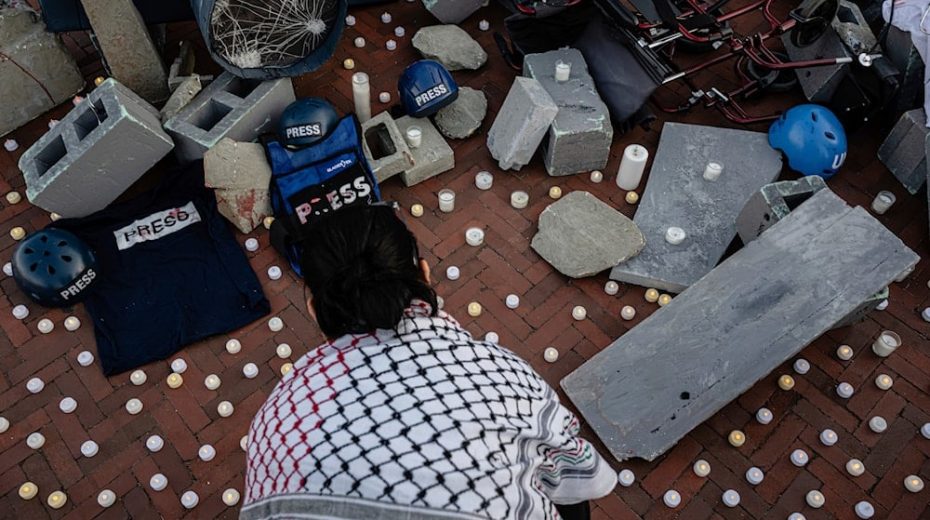
More than 250 journalists have died in Gaza since 2023, as media organizations call for secure and independent reporting conditions within the region.
Foreign correspondents stationed in occupied Palestine are pressing Israeli authorities to grant immediate press access to Gaza following the latest ceasefire deal, joining numerous media groups advocating for unbiased coverage from the blockaded area.
In a statement released Friday, the Foreign Press Association (FPA) urged “Israel” to “immediately open the borders and allow international media free and independent access to the Gaza Strip,” highlighting that the Israeli Supreme Court is set to hear the case on October 23.
This legal matter follows over a year during which, according to the FPA, the state “has been allowed to delay its response.”
Since October 7, 2023, “Israel” has effectively prevented foreign journalists from entering Gaza.
A minority of journalists gained entry only under tight control during escorted tours organized by the Israeli occupation forces. Consequently, international media have depended almost entirely on Palestinian reporters, humanitarian groups, and local civilians for on-site news.
‘Israel’ killed at least 250 Palestinian journalists
The dangers facing Palestinian journalists remain severe. The Committee to Protect Journalists (CPJ) reports that 197 Palestinian journalists and media personnel have been killed in Israeli attacks over the last two years, while other sources estimate the number exceeds 250.
Among the latest victims were Mariam Dagga, a journalist for Associated Press and Independent Arabia, along with Hussam al-Masri of Reuters, both killed during an Israeli airstrike on Nasser Hospital in Khan Younis on August 25, 2025.
Repeated Israeli Strikes Kill Journalists in South Lebanon
The CPJ has documented 25 targeted journalist killings, labeling them intentional murders. While “Israel” denies purposeful targeting, it has accepted responsibility in several cases, including the killing of renowned Palestinian journalist Anas al-Sharif.
In a related incident, a UN special rapporteur classified an Israeli attack in southern Lebanon on October 13, 2023—which killed Reuters journalist Issam Abdallah and injured six others, including two AFP reporters—as a war crime. Morris Tidball-Binz described the assault as “premeditated, targeted, and double-tapped,” emphasizing it breached international humanitarian law.
Since October 2023, numerous Israeli strikes in southern Lebanon have taken the lives of at least six journalists, notably Al Mayadeen’s Farah Omar and Rabih Me’mari, who were targeted shortly after concluding a live broadcast in Tayr Harfa. Additionally, Al Mayadeen’s Ghassan Najjar, Mohammad Reda, and Al Manar’s Wissam Qassem were killed in October 2024 when an Israeli missile struck a clearly marked press residence in Hasbayya.
Investigations carried out by AFP, Airwars, and the United Nations confirmed that the weapons used belonged exclusively to the Israeli military, with no combat exchange ongoing at the time. These revelations have led several human rights groups to label the attacks as deliberate strikes against journalists.
‘Independent reporting in Gaza is essential for transparency’
The FPA’s declaration is part of a wider campaign championing press freedom in Gaza. In July 2025, key agencies including AFP, AP, BBC, and Reuters jointly urged for international media access to the Strip. Earlier, in February 2024, over 30 media entities, including The Guardian, signed a letter advocating enhanced protection for journalists working in Gaza.
This week, the Arab and Middle Eastern Journalists Association (AMEJA) also called for the release of American journalist Emily Wilder, who was detained while taking part in Conscience, a media flotilla seeking entry to Gaza.
“Independent reporting in Gaza is essential for transparency, accountability, and global understanding of the humanitarian crisis,” the FPA stressed.
With Israeli hostilities currently paused, global media continue to press “Israel” to remove barriers and permit journalists to operate without restrictions in Gaza, highlighting both safety concerns and the public’s right to receive information.
Original article: english.almayadeen.net




